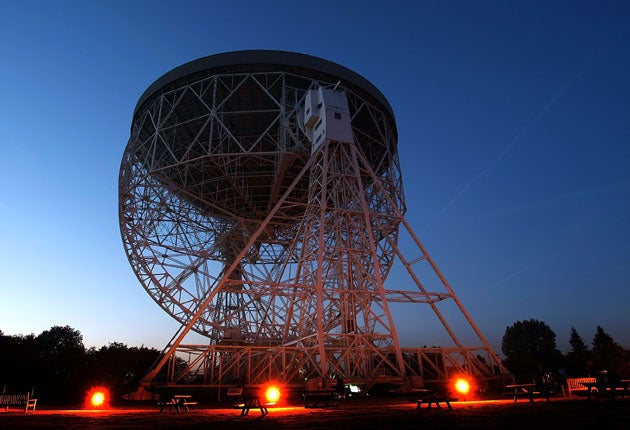Recording tracks Russia's Moon gatecrash attempt

A never-before-heard recording of the dramatic moment in which British boffins observed a Soviet attempt to scupper American victory in the race to the Moon has been made available to the public for the first time.
With characteristic understatement, scientists at Jodrell Bank, led by its founder Sir Bernard Lovell can be heard as they track the Russian’s Luna 15 probe as it crashes into the surface of the moon just hours after the American Eagle Lander was due to begin its return journey in July 1969.
In stark contrast to the whoops of jubilation from Nasa’s highly-charged mission control at Cape Canaveral in Florida, a cool calm Sir Bernard can be heard describing the unfolding events in measured tones.
As they reach their denouement one voice from the University of Manchester observatory in Cheshire can be heard to exclaim: “I say, this has really been drama of the highest order” having presumably momentarily stopped puffing on his pipe to interject. Others describe the final moments before the Russian probe is lost. One says “it’s landing” and “it’s going down much too fast” at 15.50 on 21 July while another appears to gasp with excitement.
Listen to the recording
Jodrell played a vital role during the space race of the late 1950s and 1960s. Data captured from the Lovell radio telescope, named after its creator, was used to assist the Americans not only with Apollo 11 but from the very earliest stages of man’s quest into space.
It was also pressed into service to monitor Communist progress after Moscow had stolen a march on the Americans with the successful launch of the Sputnik satellite. Sir Bernard, 96, who recently revealed how he survived an assassination attempt using a lethal radiation dose during a visit to a Soviet space facility in 1963, can also be heard during the recording to cite a “well-informed source in Moscow” who revealed a change in orbit of the Luna 15.
The probe had been launched three days ahead of Apollo. Even though it was unmanned and its exact mission unknown, great excitement surrounded the technological head to head between the world’s superpowers. Experts at Jodrell calculated that the Luna probe was on a slower trajectory than its predecessors and it entered the moons orbit four days before touchdown. The signals given of by the probe were new to observers who immediately reported their discoveries back to the Americans who feared the Russians were trying to sabotage their mission, as well as explaining events to the British public through a series of media releases.
It is calculated now however that even if it had landed safely rather than careering out of control into the lunar surface and completed its objectives of recovering soil and rock samples from the Moon, its trajectory meant it would still have been too slow to beat Neil Armstrong and his crew back to Earth and whatever limited propaganda value Moscow may have squeezed out of the situation would have been lost. During an earlier Soviet moon probe, Luna 9, the Jodrell team captured images from the craft and used a primitive fax from the offices of the Daily Express in Manchester to print the pictures being sent down from space.
Join our commenting forum
Join thought-provoking conversations, follow other Independent readers and see their replies
Comments
Bookmark popover
Removed from bookmarks